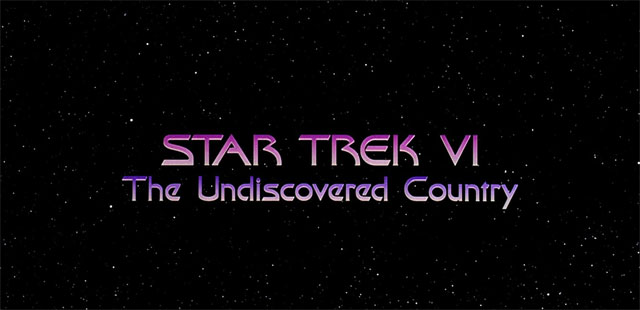
Palmer’s Trek: the final frontier. These are the voyages of Agent Palmer. On his continuing mission: to explore star trek. To seek out television series and movies. To boldly go where many fans have gone before!
Star Trek VI: The Undiscovered Country is many things. It’s heavy-handed metaphors and the laziest mystery in the original cast’s adventures on the big or small screen, but it also has a great ending for ending’s sake.
The Undiscovered Country refers to the future quoted from Hamlet, act three, scene one. It’s a toast from Gorkon that Spock recognizes and to which Gorkon says, “You have not experienced Shakespeare until you have read him in the original Klingon.”
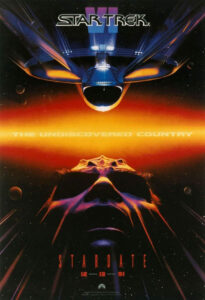
Now the Moon’s explosion starts our film, and we soon learn two things: that the Klingon’s don’t want any help, and that it’s their own fault for overmining the moon in the first place. This is all an overtly blunt metaphor about the Cold War in regards to the old Soviet Union’s issues with nuclear weapon silos, when they refused to ask for help even if they required it.
Now, the Cold War ends as this movie was released in 1991, so all this talk about Klingon vs. the Federation is relevant to a war that has been waged for a long time. As Gorkon tells Kirk, “If there is to be a Brave New World, our generation is going to have the hardest time living in it.”
These are not hard lines to draw, and that’s not necessarily a bad thing. At every turn, the writers have taken great pains to make sure this show wasn’t altruistic but philosophical and educational. This franchise, at least as far as its original cast and writers were concerned, has been a sermon. The small and large screen versions of Star Trek to this point has very much been a pulpit for the writers.
But this may be one of the most overt metaphors, second of course to the ongoing metaphor of making sure you don’t put too much trust in machines, technology, and AI – oh wait, you don’t think any of that is still relevant do you?
Anyway, the plot is set. There is a mission underway that could lead to peace, and there exists a faction of people who are against such peace. This is where, in my opinion, we get to the lazy mystery.
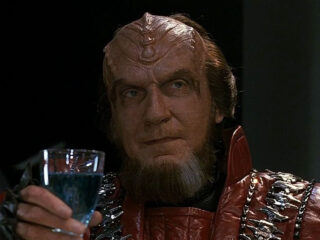
Now, perhaps shotgunning this much Trek all at once is what brings me to this conclusion, but this “obvious” inside job, and the things that will be required to unfold the tangled web of this mystery are all so obvious. I know that not all mysteries are supposed to be unsolvable and that we as the audience are supposed to get some clues, but Trek has done quite a few whodunnit-type episodes through the original series that even when combined were all more nuanced than this film. That’s why I call it lazy, because in its own history, Star Trek: The Original Series has crafted better mysteries in less time.
Now, Kirk and McCoy are stranded after a sham of Klingon jurisprudence. Spock and the remaining crew are between a rock and a hard place to try to save Captain Kirk and Dr. McCoy, all while ignoring Starfleet orders to return to base.
This kind of disobedience is an integral part not just of Star Trek but to this original crew. Let’s go back to the courtroom where the Klingon prosecution Chang describes Kirk to a T in this exchange:
CHANG: On the contrary, Captain Kirk’s views and motives are, indeed, at the very heart of the matter. This officer’s record shows him to be an insubordinate, unprincipled, career-minded opportunist with a history of violating the chain of command whenever it suited him. Indeed the record shows that Captain Kirk once held the rank of Admiral and that Admiral Kirk was broken for taking matters into his own hands in defiance of regulations and the law. Do you deny you were demoted for these charges, Captain? Don’t wait for the translation. Answer me now!
KIRK: I cannot deny it.
CHANG: You were demoted.
KIRK: Yes.
CHANG: For insubordination.
KIRK: On occasion, I have disobeyed orders.
That insubordination, that opportunism, that history of violating the chain of command is why we like Captain James Tiberius Kirk! To have it spelled out so clearly in this, his final voyage, is the beginning of how this film is a great ending for this cast and crew, despite all that I’ve written to the contrary about it to now.
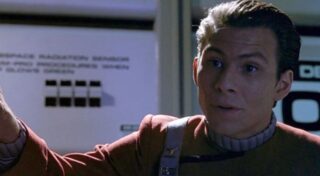
Despite my lamentations on the mystery being lazy, the dialogue writing in this film is pretty top notch, with most of the good lines spread throughout the cast. This wasn’t a film written for one character. It was written for the cast, and it’s nice to see everyone on the original crew get a chance to shine one last time.
The thing that this film gets right is the ending. This film had the impossible task of ending not only a movie but an era of a franchise. Sure at this time The Next Generation series had been going strong on television, but as far as Kirk, Spock, McCoy, Sulu, Scotty, Uhura, Chekov and those crew in uniform since 1966, this was going to be the end.
The Captain, of course gets the final word, not once but twice. He talks about the future to the Chancellor and the council at the peace talks saying, “People can be very frightened of change.” That not only addresses part of this unknown future, this Undiscovered Country as it were, but it also absolutely sets the stage to hand over of the baton in his final Captain’s Log.
“Captain’s log, U.S.S. Enterprise, stardate 9529.1. This is the final cruise of the Starship Enterprise under my command. This ship and her history will shortly become the care of another crew. To them and their posterity will we commit our future. They will continue the voyages we have begun and journey to all the undiscovered countries, boldly going where no man, where no one… has gone before.”
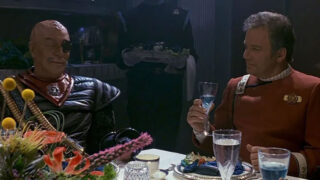
I didn’t hate this movie, but it’s heavy-handed nature is something that counts against it mainly because of how nuanced the franchise has been up to this point. Sure, there’s a grave overt fear of technology, specifically artificial intelligence, during the initial television run, but aside from that most of the messaging is nuanced to the point of almost being subversive, which I enjoyed. I wanted to have fun and enjoy space stuff, and this franchise has grown on me. I love it now, but I could have done with a more nuanced approach for this final voyage of Captain Kirk and crew.
As for the cinematic parts of this original crew and their adventures in the franchise, I’d do a final ranking at
1) Search for Spock (Star Trek III)
2) The Voyage Home (Star Trek IV)
3 tied) The Final Frontier (Star Trek V), The Undiscovered Country (Star Trek VI), The Wrath of Khan (Star Trek II)
6) The Motion Picture
And now that that is all behind me and as I have bid adieu to the original cast, it is time to continue the journey with The Next Generation.